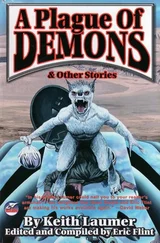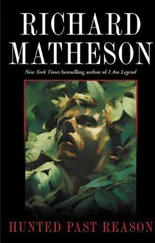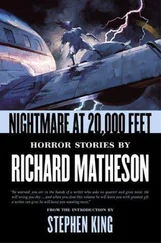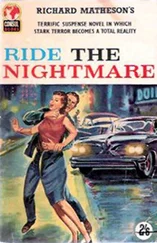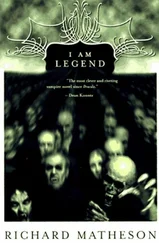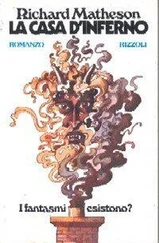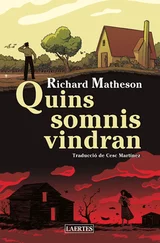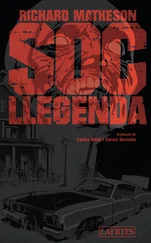I stopped and looked around, the answer readily apparent. There was no neighborhood, no houses in the distance, no Hidden Hills, no nothing. The house was isolated.
I listened to my footsteps on the driveway as I started up again. The paving was cracked and grimy, I noticed, with tufts of yellow weeds growing through.
I thought, again, of what Albert had said before he’d left me.
“She won’t believe a word you say; remember that at all times. There is no point in your trying to convince her that she’s not alive. She thinks she is. She thinks that only you are dead. For that reason, it will be as well you don’t identify yourself immediately but, rather, try, in some way- I don’t know what that way is, Chris -to gradually convince her who you are. I leave that to you; you know her better than I. Just remember that she won’t recognize you and won’t believe you if you tell her, straight out, who you are.”
I was halfway up the hill now. How dreary everything appeared. I’ve described the driveway. In addition, all the trees that lined it were dead and leafless. Passing one, I bent a twig and felt it snap off dryly in my fingers. The ground cover looked parched, the ground itself cracked by jagged fissures. I remembered how I used to complain about the look of our hill in late summer.
It had been glorious compared to this.
I stopped and hitched back suddenly from the driveway just ahead. A snake was slithering from the weeds to cross it. As I watched, it undulated slowly across the cracked paving. I tried to see its head, to make out if it was triangular. When I couldn’t; I looked at its tail to see if there was a rattle. We’d had rattlesnakes occasionally. Once, a three-footer had been living underneath a cardboard box behind the garage.
I didn’t move until the snake had disappeared into the brown grass to the right of the driveway. Then I started up again, wondering what would have happened if I’d extended my hand to the snake. It couldn’t kill me obviously, but, at this level, would I have felt the burning poison in my veins?
Looking up now, I could see the roof of the house more clearly. It appeared shadowy and blurred and I realized that I was going to have to lower my vibration again to reach this level.
It happened of its own accord once more, a feeling like the ones I’d had before, that sensation of congealing. My walk became a trudge. A transparent film crossed my eyes and the light grew even dimmer, what little color there was grew duller yet. Through a sombrous haze, I saw the house completely solid now. It looks so depressing, I thought.
I caught myself. Already , I thought. What Albert had warned me of; a sense of despair. It was easy enough to feel, God knew, my body laden, the hillside brown and arid, the sky a dullish gray, far worse than the smoggiest ugliest day I’d ever known in life.
I wouldn’t let it touch me though. I’d be with her in moments and, no matter what it entailed or how long it took, I’d do something to help her.
Something.
I reached the top of the hill and turned right toward the house where Ann now stayed.
To reach her soul

THE HOUSE LOOKED SMALLER. DINGIER. RUNDOWN.
Again, I remembered complaining, in life, about the roof; that it needed reshingling. I remembered Ann’s being disturbed about the outside of the house which needed repainting. The bushes around the house usually needed pruning, the garage straightening up.
Yet, compared to what I saw before me now, that house had been perfection.
These shingles were cracked and dirty, many of them missing. The paint on the outside walls and on the doors and window frames and shutters was faded and smudged, parts of the walls defaced by long, meandering cracks. The bushes, like those on the hill, were brown and dry, the garage a dismal sight, its oil-stained floor covered with blown-in dirt and leaves. All the trash barrels were overflowing, two of them turned over, a gaunt cat eating garbage from one.
Catching sight of me, it jerked around in fright and raced out through the rear doorway of the garage which had no door now. Through the opening, I saw the elm tree standing dead, the cracked fence sagging toward the hill.
Ann’s Honda was parked in front of the house. At first, I felt surprised to see only her car and looked around for the others, especially the camper.
It came to me then that this was her particular limbo and could only possess what she expected to see in it.
I walked to her car and examined it. The sight made me queasy. She’d always been so proud of it, kept it so immaculate. Now it looked old, its chrome pitted with rust, its paint faded, windows streaked with dirt, one side dented, one tire flat. Is this what everything is like here? I wondered.
I tried not to think about it but turned toward the front doors.
They looked old too, stained, their knobs corroded. The glass cover on the porch light was broken, shards of glass lying across the porch. A section of the slate floor was missing, the rest chipped and dirty.
Again, that sense of bleak depression. I fought it off. And I haven’t even gone inside , I thought, the idea chilling me.
Bracing myself, I knocked on the left door.
It felt grotesque to knock on the door of my own home-well, it looked like my home albeit a distorted form of it-but I knew how abrupt appearances alarmed Ann. Often, coming home at an unexpected time, I’d walked into our bedroom, meeting her as she emerged from the dressing room. She’d gasped in shock and, literally, recoiled, saying, “ Oh! I didn’t hear you come in!”
So I knocked. It was better than frightening her.
No one answered. I stood on the porch for what seemed, to me, a very long time. Then, giving up, I turned the knob and started to open the door. Its bottom scraped on the floor as I pushed it; the hinges must be loose, I thought. I stepped inside. The slate floor in the hallway looked as bad as the one on the porch.
I shuddered as I closed the door. It actually felt colder in the house than it had outside, a clammy chill hovering in the air. I clenched my teeth and walked into the living room. No matter what I saw, I vowed, I wouldn’t let it dissuade me from my reason for being there.
I’d always loved our living room, Robert: the rich, oak paneling, the built-in bookcases, the heavy, earth-tone furniture, the enormous sliding door and window overlooking the back deck and swimming pool.
I couldn’t love this room.
Its paneling and bookcases were cracked and lusterless, its furniture worn and faded. The carpeting, which I recalled as being forest green, was, now, some drab shade in between dull green and black. There was a huge, ocherous stain near the coffee table and the table itself was scratched and splintered, its oak tone completely flat.
I’d had that table handmade, always loved it. Walking over to it, I looked down at the chessboard and men Ann had had made for me one Christmas. It had been a stunning piece of craftsmanship, the board made of oak with inlaid silver filigree, the men hand-cast in pewter with bases of turned oak, all impossible to duplicate.
Now the board was cracked and dingy and five of the pieces were missing, two sagging, almost broken. I turned away from the table, telling myself that this was not the chess set I had lived with. It was hard to keep that in mind though because everything looked so familiar. The bookcases were as I remembered them-except that these were only half filled with dusty, aging books. The shutters were as I recalled-except that one of these was broken off and lying on the dirty, sun-bleached cushion of the window seat.
Читать дальше


